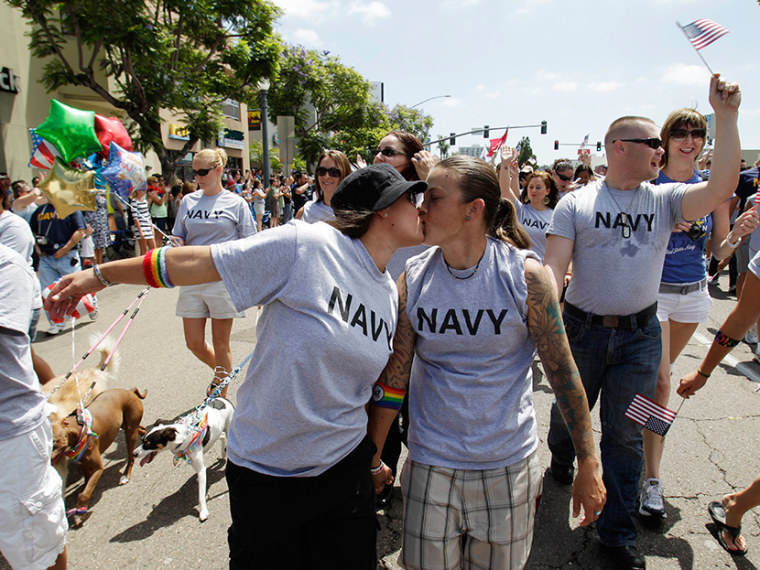Stephen McNabb knew he couldn't hide who he was—not for long anyway—so he left the Navy just a couple of years after Don't Ask Don't Tell. But when his husband Stewart Bornhoft, a retired Army Colonel who did two tours in Vietnam, complained of crippling stomach pains, McNabb knew the only choice was to take him to the Naval Medical Center of San Diego. And he knew that once he set foot in that hospital, as far as the country they'd served was concerned, Bornhoft and McNabb weren't married at all.
This was no ordinary stomach ache. Bornhoft's appendix had burst—without medical attention, he could have died. As it was, Bornhoft had to stay in the hospital for a full week during which the medical staff at the center could have treated McNabb like a stranger instead of Bornhoft's husband.
"Any nurse could have simply said I'm not comfortable with you being here, you have no relation with him, you're going to have to leave," McNabb says. "They could have treated me as persona non grata."
Whether out of compassion for the couple or deference to Bornhoft because his rank, it didn't happen that way. The staff at the medical center treated McNabb as Bonhoft's husband, even though federal law said their marriage didn't count. Waiting outside of Bornhoft's room, McNabb met a woman visiting her sister, who happened to be in the room next to Bornhoft. When she understood why McNabb was there, she confided in him that she wasn't visiting her sister, but her partner. They were afraid that if they didn't pretend to be related, the hospital staff would have turned her away.
Stories like these aren't supposed to happen anymore. Wednesday, the Supreme Court struck down the section of the Defense of Marriage Act that bans recognition of same-sex marriages. Bornhoft and McNabb, together for 16 years, were married in that small window of time that same-sex marriage was legal in California in 2008. As far as most of the federal government is concerned, they're married. Secretary of Defense Chuck Hagel announced shortly after the decision that the Pentagon "intends to make the same benefits available to all military spouses—regardless of sexual orientation—as soon as possible."
That's wonderful news for those currently serving. But veteran's benefits aren't administered by the Department of Defense, they're administered by the Department of Veteran's Affairs. And Title 38, the law governing the VA, explicitly states that "the term 'spouse' means a person of the opposite sex who is a wife or husband," leaving married same-sex couples out in the cold. Making things more complicated: because of the law and the way the ruling was written, even if the VA recognizes married same-sex couples, whether or not they are considered legally married and what benefits they are eligible for could depend on whether or not the state they live in recognizes same-sex marriage. DOMA is dead, but for veterans, a mini-DOMA lives on.
"For veterans, the marriage is determined as valid based on the state you lived in when you got married, or the state you lived in when the benefit accrued," says David McKean, an attorney with Outserve-SLDN, a group that advocates for gay and lesbian service members and their families. "Because of marriage validity determinations, we could end up with a really crazy problem, from state to state." Someone who is stationed in Texas but gets married in California could be ineligible for certain benefits as a veteran--even though service members don't get to choose where they live.
Veterans' families are supposed to be eligible for a slew of benefits depending on how long they've served: access to medical care, home loans, discounted retail goods on base, legal aid, lower rates on health insurance. Bonhoft wants to be buried in Arlington Cemetery, but under current law, McNabb can't be buried with him.
"I can't even be in eternal rest next to my spouse," says Bonhoft. "Stephen, even though he's a veteran, he is not eligible to be buried there, so he could not be buried with me, because he's of the same gender."
Bornhoft and McNabb have been fighting DOMA for a long time. When Bornhoft, who is now member of Outserve-SLDN's military advisory board, went to get McNabb a military ID so that he would be eligible for the same veteran's benefits as heterosexual married couples, he was turned away. Bornhoft knew this would happen—Bornhoft and Outserve-SLDN used the experience as part of lawsuit against DOMA. But even with DOMA struck down, veteran families headed by same-sex couples still face possible discrimination in federal law.
A lot depends on what the Obama administration decides to do. A spokesperson for the VA told msnbc that the VA was working with the Department of Justice to "implement any necessary changes to Federal benefits and obligations swiftly and smoothly." The Supreme Court's ruling made it clear that the VA law is unconstitutional, and McKean hopes the Obama administration will decide to wipe away most of the restrictions. "Given the court's ruling today he would be on solid ground doing that," McKean told msnbc on Wednesday.
Bornhoft, like thousands of others, was glued to SCOTUSBlog waiting for the results. When the DOMA ruling came down, he thought back to that week in the hospital. "This now removes any of that angst that Stephen described," Bornhoft says. "I was absolutely ecstatic."
Still, until the Obama administration's legal analysis is finished, veterans Bornhoft and McNabb won't really know what benefits they will be eligible for. As the rest of the country celebrates, veterans still have to wonder when DOMA will be over for them.
